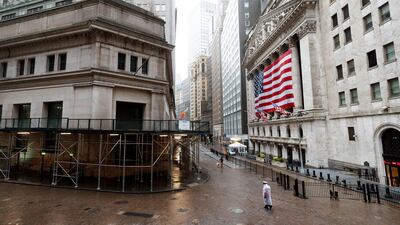The International Monetary Fund slashed its global growth projections for 2020 in its latest World Economic Outlook, with global gross domestic product expected to contract by 3 per cent this year, the worst annual performance since the Great Depression of the 1930s.
The fund anticipates a contraction of 6.1 per cent in developed markets and 1 per cent in emerging markets, unlike the 2008-09 financial crisis when emerging markets still managed to record some growth.
Among major economies the IMF expects the US to contract by 5.9 per cent, the eurozone by more than 7 per cent and the UK by 6.5 per cent, while negligible growth in China and India (1.2 per cent and 1.9 per cent respectively) means they are the only nations keeping the global recession from getting even worse.
For the GCC, the IMF unsurprisingly downgraded growth forecasts for 2020 across the region as well. The Fund now expects the UAE economy to contract by 3.5 per cent this year, while Saudi Arabia is forecast to shrink 2.3 per cent.
Budget deficits are also all projected to widen sharply this year, with Oman and Bahrain likely to be the largest in the GCC, widening by 16.5 per cent of GDP and 15.7 per cent of GDP respectively. The IMF is forecasting a budget shortfall of 12.5 per cent in Saudi Arabia and 11.1 per cent in the UAE this year. However, growth is expected to rebound in 2021 with the UAE expected to grow by 3.3 per cent and Saudi Arabia by almost 3 per cent.
The IMF described the challenges that EM economies are facing currently as a "perfect storm", in that they have experienced the sharpest reversal in portfolio flows on record, of about $100 billion (Dh367.3bn), putting pressure on the more leveraged and less creditworthy borrowers.
Last week certainly felt like a perfect storm in terms of the sharp deterioration in economic activity that was catalogued. US economic indicators such as industrial production, housing, business surveys and retail sales all revealed monthly declines that are at, or near, record lows. US initial jobless claims over the past four weeks reached 22 million, or nearly 15 per cent of the US workforce, effectively wiping out all the US employment gains since the end of the last US recession in December 2009.
Chinese data also showed real GDP declining 6.8 per cent year-on-year in the first quarter, the biggest contraction since the country began reporting official figures in 1992. The concern of course is that in most of the world the first quarter is unlikely to be the worst period of this crisis, with the second quarter expected to reveal much bigger contractions elsewhere. Warnings were heard last week that UK GDP could fall by as much as 35 per cent in this quarter, while US growth estimates are equally apocalyptic.
However, parallel to all of the bad news, there have also been glimmers of hope. For one thing markets are taking a more optimistic view of the situation, with the S&P 500 index having recovered 55 per cent of its first quarter collapse. As jarring as this might seem when so many jobs are being lost, markets are seeing light at the end of the tunnel with reduced numbers of coronavirus cases in some of the worst affected countries, and moderating mortality rates in others.
Markets are also encouraged that fast action by global policymakers has staved off what could have been a much worse economic crisis and set the grounds for an eventual recovery, so much so that the narrative is increasingly turning to when can economies re-open, with some European countries already starting to.
Across the world, policy responses have been exceptional, both in terms of their sizes and their speed. It may well be that markets are merely thriving on the injection of unprecedented amounts of liquidity into the financial system, and are fearful of fighting the US Federal Reserve, but it can also be seen that stimulus steps are finding their way to end users, with household relief cheques starting to be received across the US and other relief programmes getting tapped out.
Outside the US, the experience is perhaps more mixed, with much still needing to be done, but at least it cannot be said that governments and central banks have held back. If in the end it still proves too little to counter the perfect storm this will probably be a function of the unique enormity of this crisis, not the temerity of the response.
Tim Fox is Chief Economist & Head of Research at Emirates NBD


